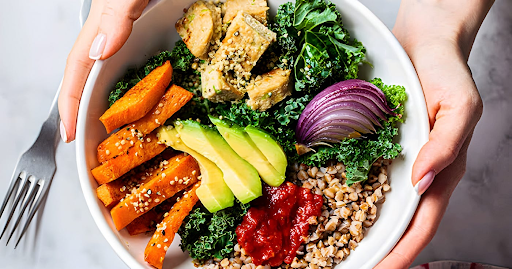Common Weight Loss Myths Debunked: Separating Fact from Fiction
Weight loss is one of the most discussed topics in health and wellness, but it’s also a breeding ground for misinformation. This can make it hard to separate myths from facts. Here, we’ll clear up some of the most common weight loss myths, so you can approach your goals with a clearer understanding.
Myth #1: Skipping Meals Helps You Lose Weight
Fact: Skipping meals can actually make weight loss harder.
Many people think that if they eat less by skipping meals, they’ll lose weight faster. However, skipping meals can backfire. When you go too long without eating, your body’s metabolism slows down because it senses a lack of food and tries to conserve energy. This can lead to more intense hunger later on, making it more likely for you to overeat or make unhealthy choices at your next meal.
Instead of skipping meals, focus on eating regular, balanced meals that include protein, fiber, and healthy fats. This approach keeps your energy stable and helps control hunger.
Myth #2: Carbs Are the Enemy
Fact: Carbohydrates can be part of a healthy weight loss plan.
Low-carb diets, like keto, have become popular in recent years, and they can help some people lose weight. However, that doesn’t mean that all carbs are bad. Whole grains, fruits, and vegetables provide essential nutrients and fiber, which are good for your health and help you feel full.
The key is to focus on quality, not quantity. Complex carbs, like whole grains, are digested more slowly and keep your blood sugar stable. Simple carbs, like sugar and white bread, are the ones to avoid as they can cause blood sugar spikes and crashes, leading to cravings and overeating.
Myth #3: Eating Fat Makes You Fat
Fact: Healthy fats are an important part of a balanced diet and can even help with weight loss.
The idea that eating fat makes you gain weight is outdated. While fats are higher in calories than proteins or carbs, they are also essential for many bodily functions and can help keep you feeling full. Healthy fats, like those found in avocados, nuts, seeds, and olive oil, can actually support weight loss by promoting satiety and reducing the urge to snack.
Avoid unhealthy fats like trans fats and limit saturated fats, but don’t cut out fats completely. Including healthy fats in your meals can help you enjoy your food more and keep your hunger in check.
Myth #4: You Can Target Fat Loss in Specific Areas
Fact: Spot reduction, or targeting fat loss in specific areas, doesn’t work.
Many people want to lose weight in certain "problem areas" like the stomach, thighs, or arms, and there are countless programs and products that claim to help. However, our bodies don’t lose fat in one specific area just because we work out that area more.
Fat loss happens when you burn more calories than you consume, and the body decides where it will lose fat from first. This varies for everyone and is largely controlled by genetics. Exercises can strengthen and tone specific muscles, but they won’t directly burn fat in that area. To see fat loss, focus on overall weight loss through a combination of healthy eating and exercise.
Myth #5: All Calories Are the Same
Fact: Not all calories are created equal.
Technically, a calorie is a unit of energy, and on a basic level, weight loss occurs when you burn more calories than you eat. However, the quality of the calories matters a lot. For example, a 200-calorie donut is very different from 200 calories of vegetables. The donut is high in sugar and refined carbs, which can cause a quick spike and then a crash in your energy levels. On the other hand, vegetables provide fiber, vitamins, and steady energy.
Whole foods (like fruits, vegetables, lean proteins, and whole grains) are generally more filling and nutritious, which can help you stay satisfied and energized while in a calorie deficit.
Myth #6: Eating Late at Night Leads to Weight Gain
Fact: It’s not when you eat, but what and how much you eat.
The idea that eating after a certain time (like 7 or 8 p.m.) leads to weight gain is widespread, but weight gain is more about overall calorie intake than the time of day. If you’re eating healthy, balanced meals throughout the day, a late-night snack won’t necessarily cause weight gain.
However, many people do tend to make less healthy choices late at night, like chips, sweets, or fast food. Eating out of boredom or habit rather than hunger can lead to consuming extra calories. If you’re hungry at night, try choosing a nutritious snack, like a small portion of Greek yogurt, a piece of fruit, or a handful of nuts.
Myth #7: Supplements and Fat Burners Are Essential for Weight Loss
Fact: Most supplements and fat burners don’t provide significant weight loss benefits and may even be harmful.
The weight loss industry is flooded with pills, powders, and teas that claim to boost metabolism or burn fat. However, most of these products have limited scientific backing and often come with potential side effects. Some may even harm your metabolism or cause other health issues in the long run.
A healthy diet and regular exercise are much more effective for sustainable weight loss than any supplement. If you’re considering a supplement, it’s best to consult with a healthcare provider first.
Myth #8: Eating Small, Frequent Meals Boosts Metabolism
Fact: Meal frequency doesn’t have a major impact on your metabolism or weight loss.
Some people believe that eating small meals every few hours helps boost metabolism, but research shows this isn’t necessarily true. What matters more is the total calories you consume over the day rather than how often you eat.
If you enjoy small meals throughout the day, that’s fine! But if you prefer three larger meals, that’s also okay. The best meal pattern is one that keeps you satisfied and fits into your lifestyle, as long as it aligns with your daily calorie needs.
Myth #9: Exercise Alone Will Lead to Significant Weight Loss
Fact: Exercise is crucial for health, but diet plays a bigger role in weight loss.
Exercise has countless benefits for your physical and mental health, but relying on exercise alone without adjusting your diet is unlikely to lead to significant weight loss. A large portion of weight loss comes from reducing your calorie intake. For instance, you’d need to run for about an hour to burn off the calories in one slice of pizza, which can be challenging to sustain daily.
A combination of a healthy diet and regular exercise works best. Think of exercise as a tool to boost metabolism, improve mood, and help with overall health, while diet controls your calorie intake more directly.
Myth #10: You Have to Give Up Your Favorite Foods to Lose Weight
Fact: Moderation is key; you don’t have to give up all treats.
Many diets promote an “all-or-nothing” mentality, but restrictive dieting often leads to feelings of deprivation, which can cause overeating or binging later. Instead, focus on moderation. Allowing yourself small portions of your favorite treats occasionally can help make your weight loss plan more sustainable.

For example, if you love chocolate, having a small piece rather than banning it entirely can keep you on track without feeling deprived. Balance is essential for long-term success.
In Conclusion
Weight loss doesn’t need to be overly complicated or full of myths. By understanding and letting go of these common misconceptions, you can approach weight loss with realistic expectations. Focus on balanced meals, consistent exercise, and finding a routine that works for you. Sustainable weight loss takes time, so be patient with yourself and remember that small, consistent changes often lead to the best results in the long run.










